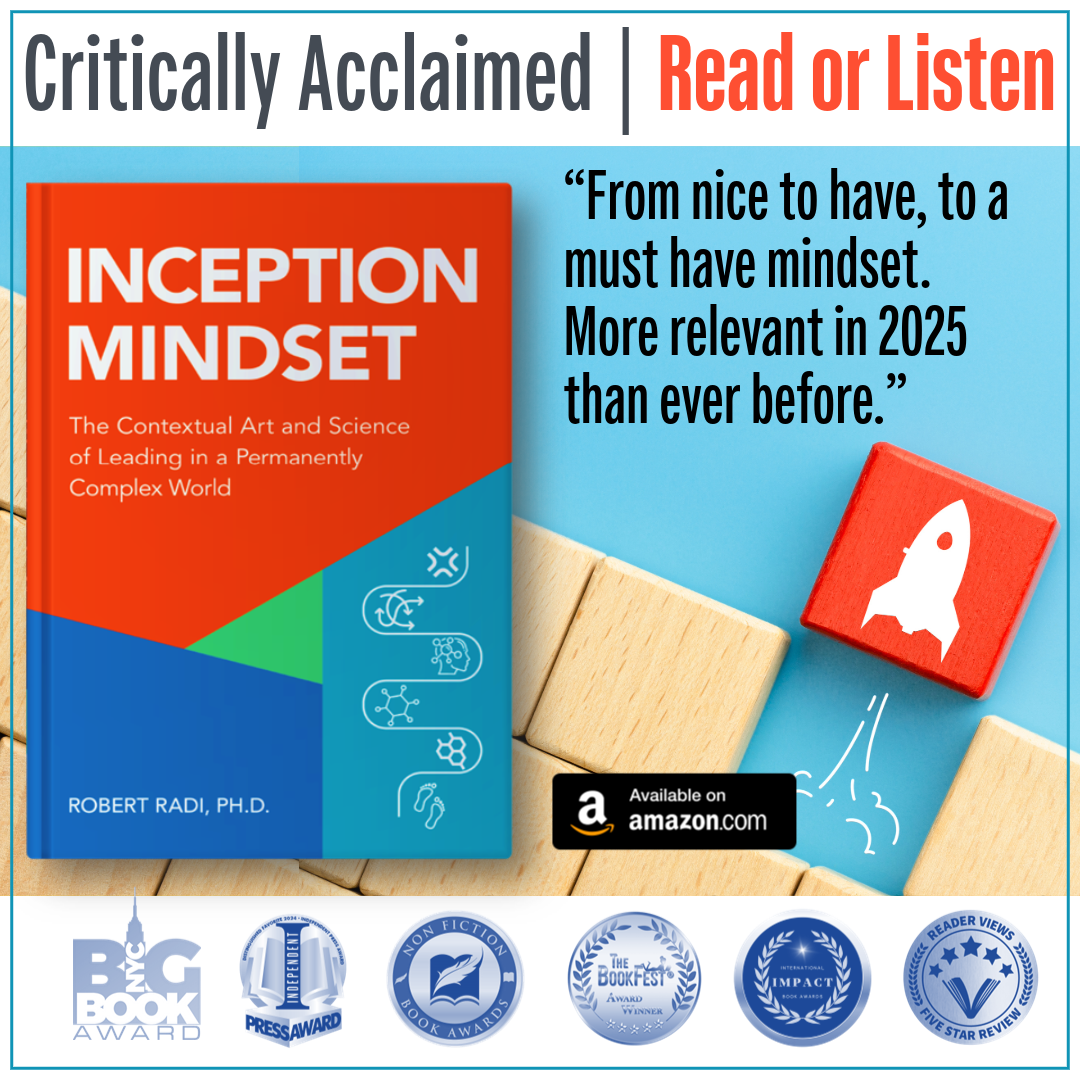
Summer 2025 | By Dr. Robert Radi
Award-winning author and innovation strategist. President and Partner at Integral Advantage®, an IACET-accredited organization committed to cultivating leadership, strategic capacity, and organizational effectiveness across private and public sector entities. You can follow him on LinkedIn.
You Can Listen to the Article
Introduction: Advice is Bounded Perspective
Seeking advice cannot substitute for our responsibility in the decision-making process. We all grew up with ‘advice’ from our parents, and as parents, we give ‘advice’ to our kids. The pseudo-advice often follows a familiar structure: “I advise you to [insert desired behavior], or you will not get [insert imposed consequence].” It is most definitely prescriptive.
When people casually ask me if they can pick my brain, I know they’re looking for advice in one form or another. I promptly reply, “Sure! You can pick whatever is left of it.” It’s part self-deprecating humor, part subtle signal: I will offer perspective, not a prescription.
In 2023, Maestro, the biographical romantic drama, spotlighted the relationship between American composer Leonard Bernstein and his wife, Felicia Montealegre. The film renewed public appreciation for Bernstein’s talent while revealing more of him as a person. But it wasn’t the film that struck me as much as an earlier interview from the circa 1980 Kennedy Center Honors.
In it, the presenter shared that when Leonard showed an early interest in music, his father, Samuel, discouraged him. When asked about this later, Samuel replied, “How could I know he’d turn out to be Leonard Bernstein?” It was a humorous and intellectually honest answer—and a reminder that advice must be processed for what it is: another person’s perspective, bound by their own experience and perception. It doesn’t necessarily mean they don’t believe in you; it may simply mean they lack a clear understanding of your vision.
Intentionally Seeking Advice
Advice in the digital age is much like old-school weather forecasting: abundant yet varied. It’s essential to sift through it, not merely absorb it. Weighing advice against your internal compass involves asking, “Does this resonate with my goals and values?” It’s about being strategic, not just in reception but also in application.
When Advice Conflicts: Emotional Triggers and Self-Reliance
Advice can stir feelings, like validation, contradiction, defensiveness, or hope. When advice goes against your desired outcome, it’s not a stop sign. It’s an invitation to pause and reflect. It’s about finding equilibrium between heart and mind, passion and reason. Ultimately, the decision is ours to make, and we must be vigilant not to fall into the interpersonal dependency trap—a dynamic where one relies too heavily on others for decisions and support. While some degree of dependency is normal in relationships, excessive dependency weakens personal agency and erodes autonomy.
Strategic Networks: Choosing the Right Advisors
Knowing when to seek advice and whom to approach is as crucial as a strategic move in chess. It’s about reading the board, anticipating implications, and choosing your confidants wisely. This involves constructing your own ‘advice network’—a mosaic of trusted individuals who bring diverse and complementary wisdom to your table. But advice is not just something we seek. Often, we’re on the other side—asked to provide guidance ourselves.
Intentionally Giving Advice
In the intricate dance of human interaction, advice isn’t just a transfer of words; we can conceptualize it as a melody played on the strings of psychology. When we examine the art of giving advice, we find it’s not about commandments. It’s about dialogue—a blend of trust, empathy, and respect. Advice often reflects power dynamics and the nature of connection in relationships.
Perspective as Empowerment: Listening Before Guiding
Offering advice is like painting a suggestive, not assertive, composition. It’s about guiding without dictating. Picture this: you’re not just speaking; you’re listening intently. You’re tuning into the emotion behind the words and the situation’s nuance. In that space, advice becomes a tool of empowerment, a beacon that guides without overshadowing.
Cultural Context: Advice Is Never Neutral
Culture and social fabric are also woven into the intricacy of advice. In our global village, understanding the cultural undertones of advice isn’t just courteous, it’s essential. Advice-giving is not culturally neutral. Appreciating the spectrum of cultural influences that shape how advice is given and received reinforces the need for cultural literacy in our interactions.
The Emotional Tightrope in Relationships
Advice as Bridge or Barrier: Navigating Relationship Dynamics
Navigating the world of advice is akin to walking a tightrope high above the landscape of our relationships. On this precarious walk, every word we speak and every suggestion we make can alter the delicate balance between strengthening bonds and creating rifts.
When we give advice, it’s not just our words that matter but the emotions and intentions behind them. Think of advice as a bridge made of words, spanning the gap between two people. If built with care, empathy, and understanding, this bridge can connect two worlds, bringing them closer together. It can create a shared space where support, trust, and mutual growth flourish.

Inception Mindset is an open invitation for introspective discovery and strategic actions. Available in print, eBook, and audiobook formats. Hint: This book has nothing to do with a fictional movie, and everything to do with emerging new realities and points of inception. Get your copy here!
But if not constructed thoughtfully, that same bridge can become a wall. When advice is delivered without sensitivity to the other person’s emotional needs, it can feel like an imposition or a critique of their competence. This, in turn, can lead to feelings of inadequacy or defensiveness. Instead of being a tool for growth, advice becomes a source of distance and conflict. The line between belittling criticism and constructive feedback is often misunderstood—yet it makes all the difference.
Techniques for Navigating with Care
To successfully walk this tightrope, we must blend emotional intelligence with strategic awareness. That means tuning into the other person’s state of mind, recognizing when to speak and when to listen, while honoring their autonomy in the process. Often, the most supportive thing we can offer isn’t a solution, it’s space.
Some of the most effective techniques for navigating this include:
Reflective listening: Paraphrase to show understanding before offering input.
Asking permission: A simple “Would you like my thoughts?” preserves agency.
Emotional self-checks: Ensure your motivation is to empower, not assert control.
Balancing honesty and empathy: Deliver hard truths with care and respect.
By weaving these techniques into our daily interactions, we enhance our ability to give advice that builds connection rather than resistance.
Conclusion: Advice as Connection, Not Control
At its best, advice is not about asserting control or offering shortcuts but about deepening connection. When given with empathy and received with discernment, advice becomes a bridge that links experience to aspiration, perspective to possibility, and—most importantly—person to person.
In a world overwhelmed by commentary and counsel, the real strength lies not in how much advice we collect but in how well we integrate it without surrendering our judgment. Whether offering insight or seeking clarity, remember that advice is a tool, not a command. It should illuminate, not overshadow.
The most lasting advice doesn’t tell us what to do; it helps us hear our voice more clearly. In that clarity, relationships are strengthened, trust is earned, and growth is shared.
2025 © Integral Advantage®
END OF ARTICLE
We trust you enjoyed this thought-provoking article. Subscribe below to be notified of future articles. Please feel free to share it on your favorite social media platforms.
For more articles like this, click here to visit the article section. Thank you!


